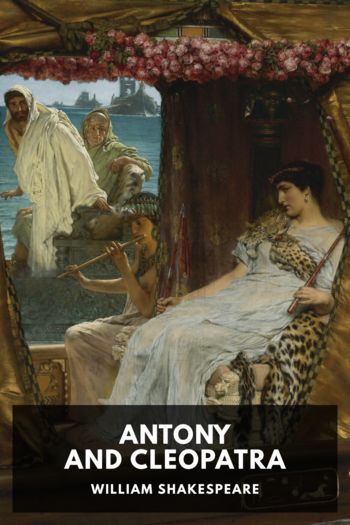Commentaries on the Gallic War, Julius Caesar [the chimp paradox TXT] 📗

- Author: Julius Caesar
Book online «Commentaries on the Gallic War, Julius Caesar [the chimp paradox TXT] 📗». Author Julius Caesar
For their ships were built and equipped after this manner. The keels were somewhat flatter than those of our ships, whereby they could more easily encounter the shallows and the ebbing of the tide: the prows were raised very high, and in like manner the sterns were adapted to the force of the waves and storms which they were formed to sustain. The ships were built wholly of oak, and designed to endure any force and violence whatever; the benches, which were made of planks a foot in breadth, were fastened by iron spikes of the thickness of a man’s thumb; the anchors were secured fast by iron chains instead of cables, and for sails they used skins and thin dressed leather. These were used either through their want of canvas and their ignorance of its application, or for this reason, which is more probable, that they thought that such storms of the ocean, and such violent gales of wind could not be resisted by sails, nor ships of such great burden be conveniently enough managed by them. The encounter of our fleet with these ships was of such a nature that our fleet excelled in speed alone, and the plying of the oars; other things, considering the nature of the place and the violence of the storms, were more suitable and better adapted on their side; for neither could our ships injure theirs with their beaks (so great was their strength), nor on account of their height was a weapon easily cast up to them; and for the same reason they were less readily locked in by rocks. To this was added, that whenever a storm began to rage and they ran before the wind, they both could weather the storm more easily and heave to securely in the shallows, and when left by the tide feared nothing from rocks and shelves: the risk of all which things was much to be dreaded by our ships.
Caesar, after taking many of their towns, perceiving that so much labour was spent in vain and that the flight of the enemy could not be prevented on the capture of their towns, and that injury could not be done them, he determined to wait for his fleet. As soon as it came up and was first seen by the enemy, about 220 of their ships, fully equipped and appointed with every kind of naval implement, sailed forth from the harbour, and drew up opposite to ours; nor did it appear clear to Brutus, who commanded the fleet, or to the tribunes of the soldiers and the centurions, to whom the several ships were assigned, what to do, or what system of tactics to adopt; for they knew that damage could not be done by their beaks; and that, although turrets were built on their decks, yet the height of the stems of the barbarian ships exceeded these; so that weapons could not be cast up from our lower position with sufficient effect, and those cast by the Gauls fell the more forcibly upon us. One thing provided by our men was of great service, viz. sharp hooks inserted into and fastened upon poles, of a form not unlike the hooks used in attacking town walls. When the ropes which fastened the sail-yards to the masts were caught by them and pulled, and our vessel vigorously impelled with the oars, they [the ropes] were severed; and when they were cut away, the yards necessarily fell down; so that as all the hope of the Gallic vessels depended on their sails and rigging, upon these being cut away, the entire management of the ships was taken from them at the same time. The rest of the contest depended on courage; in which our men decidedly had the advantage; and the more so because the whole action was carried on in the sight of Caesar and the entire army; so that no act, a little more valiant than ordinary, could pass unobserved, for all the hills and higher grounds, from which there was a near prospect of the sea, were occupied by our army.
The sail-yards of the enemy, as we have said, being brought down, although two and in some cases three ships of theirs surrounded each one of ours, the soldiers strove with the greatest energy to board the ships of the enemy; and, after the barbarians observed this taking place, as a great many of their ships were beaten, and as no relief for that evil could be discovered, they hastened to seek safety in flight. And, having now turned their vessels to that quarter in which the wind blew, so great a calm and lull suddenly arose, that they could not move out of their place, which circumstance, truly, was exceedingly opportune for finishing the business; for our men gave chase and took them one by one, so that very few out of all the number, and those by the intervention of night, arrived at the land, after the battle had lasted almost from the fourth hour till sunset.
By this battle the war with the Veneti and the whole of the sea coast was finished; for both all the youth, and all, too, of more advanced age, in whom there was any discretion or rank, had assembled in that battle; and they had collected in that one place whatever naval forces they had anywhere; and when these were lost, the survivors had no place to retreat to, nor means of defending their towns. They accordingly surrendered themselves and all their possessions to Caesar, on whom Caesar thought that punishment should be inflicted the more severely, in order that for the future the rights of ambassadors might be more carefully respected,





Comments (0)